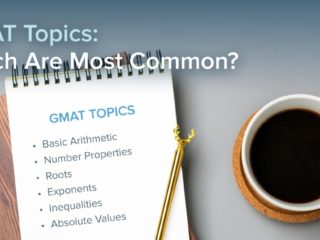Last Updated on May 3, 2023
GMAT OFFICIAL GUIDE PS
Solution:
We would never be asked to calculate 3^8 or 2^8, so we must approach this problem not as an arithmetic question but as an algebraic one.
The first thing we must recognize is that we are being tested on the algebraic factoring technique called the “difference of squares.” Recall that the general form of the difference of squares is:
x^2 – y^2 = (x + y)(x – y)
Similarly, we can treat 3^8 – 2^8 as a difference of squares, which can be expressed as:
n = (3^4 + 2^4)(3^4 – 2^4)
We can further factor 3^4 – 2^4 as an additional difference of squares, which can be expressed as:
(3^2 + 2^2)(3^2 – 2^2)
This finally gives us:
n = 3^8 – 2^8 = (3^4 + 2^4)(3^2 + 2^2)(3^2 – 2^2)
The numbers are now easy to calculate:
n = (81 + 16)(9 + 4)(9 – 4)
n = (97)(13)(5)
We are being asked which of the answer choices is NOT a factor of n, which we have determined to be equal to the product (97)(13)(5). So we must find the answer choice that does not evenly divide into (97)(13)(5).
Right away we see that 97, 13 and 5 are all factors of (97)(13)(5).
This leaves us with 65 and 35. We should notice that (97)(13)(5) = (97)(65). Thus, 65 also is a factor of n. Only 35 is not.
Answer: C



